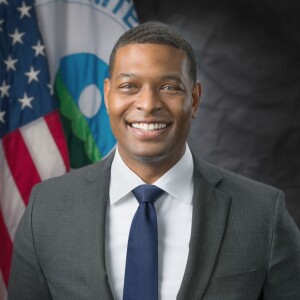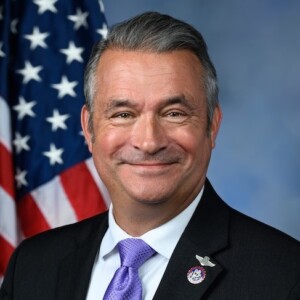Podcast Transcript: Four Corners Food Collaborative
[EPISODE TRANSCRIPT] [Ernest House, Jr.] When you look at the COVID response for communities, you also have to look at the structure pre-COVID, meaning we had unfunded health care systems, public safety measures, gaps in education needs. A lot of these fiduciary responsibilities provided by the federal government and have some involvement with the states have already created just a very delicate system and then you have what we have now in our pandemic and all of these structures are stressed.
[Marques Chavez] That’s Ernest House Jr. He is a member of the Ute Mountain Ute Tribe, which is primarily located in Southwest Colorado and Southeast Utah. House served as the executive director of the Colorado Commission of Indian Affairs for more than 11 years, and he now currently serves as the director of the American Indian/Alaska Native program for the Keystone Policy Center. The Keystone Policy Center is a nonprofit organization based out of Keystone, Colorado whose mission is to empower leaders to reach common higher ground. I know, that tagline is a bit…ambiguous. But in our defense, you can’t really describe the work of Keystone in just a few short sentences, and beyond that, the impact of that work. That’s the reason why I decided to create this podcast, which I am calling Keystones. My name is Marques Chavez, I am the communications director for the Keystone Policy Center. For more than 45 years, Keystone has guided leaders looking to overcome national and local policy conflicts they previously thought were insurmountable on issues like energy, environment and public lands, education, health, agriculture, emerging genetic technologies, and tribal communities. I love the work we do but what drives me is the why. Why we engage in this work, and that’s what I hope you’ll understand through this series. And coming off of a year unlike any other in recent memory, the first place I have to begin is with COVID-19, and more specifically, its disproportionate impact on our tribal communities.
In August, the Centers for Disease Control and Prevention issued a study on COVID-19 Among American Indian and Alaska Native Persons. In 23 states with sufficient COVID-19 patient race and ethnicity data, the overall COVID-19 incidence among American Indian/Alaska Native persons was 3.5 times that among white persons. The study confirmed that American Indian and Alaska Native persons are being disproportionately affected by the COVID-19 pandemic; however, the data is limited, making it difficult to quantify the disparity in COVID-19 incidence, severity, and outcomes among American Indian/Alaska Native persons. The underreporting of the data is just one of a long list of examples of historical trauma and inequity faced by tribal communities throughout the history of the United States.
Shortly after the pandemic began to rage, Ernest House jr. pivoted the work he was already engaged in on behalf of the Keystone Policy Center with Colorado’s the two federally recognized tribes—the Ute Mountain Ute and the Southern Ute Tribes—in an effort to put together a coalition to help support a COVID-19 response initiative in Southwest Colorado.
[Ernest House, Jr.] Initially when we at Keystone first looked into supporting tribes and the need the COVID-19 response over a two month time frame, I think we were able to reach out to different organizations and foundations in Colorado and successfully raised in a matter of just a couple months over I think it’s over 360,000 for the COVID-19 response efforts to go down to Southwestern Colorado, particularly the Ute Mountain Ute Tribe, quickly seeing that the need was around food distribution, mental health, support, and education.
[Marques Chavez] Unifying coalitions of leaders to work together to overcome challenges is Keystone’s bread and butter, so that was the approach House took to raise resources to meet the needs of the tribes. Prior to the pandemic, he had already been working with the Ute Mountain Ute tribe on developing a food distribution initiative—one that would serve the entire Four corners region—that’s the area of the country where Colorado, Utah, New Mexico and Arizona come together. Why was House already working on that initiative?
[Todd Geisen] We live in a food desert. Not only do we live in the desert period, but we also live in that food desert here in Towaoc because the nearest grocery store is over 13 miles away and then during COVID because of travel restrictions, that’s heightened.
[Marques Chavez] That is Todd Geisen, the Mógúán Behavioral Health Program Director for the Ute Mountain Ute Tribe succinctly describing the food security needs of this area of the country…and how this one longstanding issue of food security became significantly heightened during the COVID-19 pandemic. As infections began to rise in the state in the spring, tribal leadership instituted safety measures to protect its members—measures like curfews and limiting travel on and off the reservation. Those measures were effective at limiting the exposure of tribal members to the coronavirus, but it also made getting food even more difficult that it already was. So, with Ernest already engaging with the Ute Mountain Ute tribe on developing a food distribution initiative, he simply pivoted to meet the more immediate food needs of the tribes once the pandemic hit.
[Ernest House, Jr.] If you want to, if you need to limit and you want to limit the interaction with your travel Members, then of course tribal leadership has to supplement, bringing those services onto the tribe and so in doing so, the tribe was quick to create a food delivery system with our shut down casino, the Conference Center was quickly turned into a food distribution hub. So donations that were being made to Ute Mountain were sorted and then delivered to 675 homes in our tribal community, I mean. And and these are communities that need it that are great are in great need of those food and supply donations.
[Marques Chavez] Todd Geisen further explains how the food distribution effort came together…
[Todd Geisen] Some calls were made to Feeding America and Care and Share Food Bank of Southern Colorado and during COVID I can’t say enough good about them. They delivered literally within a first call. They delivered 7 tons of the emergency Food Assistance Program known as T-Fap to the reservation here in Towaoc. And Kia Whiteskunk who oversees our rec program went from being the recreation director to overseeing this T-fap distribution. And then Keystone brought in some partners and they oversaw the distribution of all this food with an army of volunteers.
[Marques Chavez] The Ute Mountain Tribe was able to create a food distribution system where one didn’t exist to feed its members while also securing their health and safety during the most devastating pandemic in a century. And while the effort has been a success, the lingering issue of food and water security still remains—not only for the tribes in Southwest Colorado, but for rural and tribal communities in the entire southwestern region of the country.
[Todd Geisen] Ernest and I have had recent talks as of late about regional food security, not just for the Ute Mountain Tribe but for also our surrounding community and counties and also our surrounding travel partners down South of us. And they faced food security during Covid. And what does it look like to bring about regional food security? That is, that’s going to be a massive solution because I know that Care and Share Food Bank has a plan and it would be amazing if we could see those two plans come together with Keystone as a facilitator to bring something to Montezuma County or to Ute Mountain specifically to be that regional catch-all because we’re so far off of the main transit lines, there’s got to be something that we do and Ernest and I’ve had that conversation and what does it look like? It’s going to be a massive, massive undertaking because it’s going to have to talk about tribal needs as well as our neighbor’s needs.
[Marques Chavez] House reiterates that the resources are available within the tribal communities to secure regional food distribution. The best approach to developing such a system will be driven, developed, and operated by tribes…and he is looking to have Keystone be a part of those conversations.
[Ernest House, Jr.] The idea of coming up with the Four Corners Food Collaborative is is bringing all those folks to the table. All those different tribes to say when these areas, especially during the pandemic, have to shut down, how do we ensure that these places receive food? Is that creating a food distribution center, particularly run by and operated by tribes? How do you maintain that type of system, especially when these areas are already identified as food deserts? They may or may not have grocery stores in their local communities. I said that majority of these large big box companies are if you look at the Four Corners region around the on the edges of those communities—so Flagstaff, AZ, Farmington, NM, Cortez, Co, Gallup, NM—so these areas are seen as the you know, on the outskirts of these reservation systems, but there’s hundreds of miles within the extent of those reservations and there’s thousands and thousands of people that live in those areas, and especially it’s like kind of what folks have seen with the response of the Navajo Nation, a good portion of 40, not 40% of the population does not have running water. A lot of those areas don’t have electricity. So when you throw on this type of pandemic, especially trying to create a food system that works within tribal communities, I think it’s kind of like what we’ve approached. Other areas that it can only happen at this tribally driven and tribally supported, and I think that’s part of the conversation we’re looking at starting.
[Marques Chavez] The conversation about food distribution as part of a COVID-19 response effort, and the longterm development of a regional food distribution system, is only one example of the structural hurdles faced pre-COVID that have only been exacerbated during the pandemic. And these issues take a significant toll on these communities, and in some cases, are a matter of life and death. On the next episode of Keynotes, a podcast from the Keystone Policy Center, we discuss the rising mental health concerns in Southwest Colorado.
[Ernest House, Jr.] There were two, two young people who unfortunately committed suicide in my tribal community. And in the state of Colorado, the Southwestern Slope in general has a lot of very high numbers of teen suicide rates. And I didn’t want the conversation around the mental health need to miss the tribal communities because there was potential lack of communication or because the strength of that relationship was not there.
[Marques Chavez] The Keystone Policy Center is a 501C3 nonprofit organization based out of Keystone, Colorado which, for more than 45 years, has empowered leaders to reach common higher ground. I am Marques Chavez, the communications director for Keystone and this episode of the Keynotes podcast has been made possible by contributions from the Ballantine Family Fund and the Denver Foundation. If you would like to learn more about Keystone Policy Center, visit our website at keystone.org.
[EPISODE ENDS]









